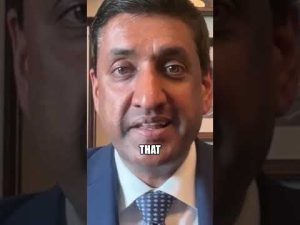The circus that is the political landscape these days is enough to make anyone’s head spin, especially if you keep an eye on the ongoing saga of the January 6th defendants. In a recent hearing, Pam Bondi, a fierce defender of President Trump and potential attorney general, was placed in front of a Senate committee, facing questions that could rival an episode of a game show gone wrong. Only in Washington could a simple confirmation hearing become a theatrical performance replete with drama, tension, and an audience wondering if they accidentally tuned into the wrong channel.
Bondi stood tall, responding to questions like a seasoned performer. With the conviction of a Shakespearean actor, she reiterated that any pardons for the January 6th protestors would be considered on a “case-by-case basis.” This vague promise might have satisfied some, but for many, it left a lot to chew on. You could almost see the Republican senators squirm in their seats, grappling with the reality that discussing pardons for their own constituents—people who they absolutely do not want to alienate—was somehow lower on their priority list than ensuring everyone knew Joe Biden was indeed the President.
What’s even more puzzling is how these Senate Republicans seem to be stuck in a time loop; they’ve frantically pressed the rewind button on the last election like it’s a favorite track on an old mixtape. It’s almost as if they can’t shake off the ghost of January 6th. The questions they asked were all too familiar, regurgitating narratives so stale, mold might have begun to grow on them. Meanwhile, the real issue—addressing the weaponization of the DOJ and the FBI—was left hanging like a forgotten laundry load.
As the hearing progressed, it was apparent that the GOP was missing in action when it came to acknowledging the plight of those J6 defendants. Caught between the demands of their base and the fear of the mainstream media backlash, they once again opted to trot out tired themes about school board meetings and the supposed surveilling of Catholics. This heartwarming concern for random demographics obviously missed the mark of directly supporting their own constituents who have been harshly dealt with by the federal government. Perhaps they’ve mistaken “supporting the base” for “ignoring what the base actually cares about.”
In a flash of clarity, one commentator pointed out that the focus should not just be on separating the “good” protestors from the “bad” ones, as if we are sorting through a box of crayons. Instead, the narrative needs to pivot toward the blatant injustices being done by the DOJ and FBI. These folks aren’t just flushing the rights of a group of people down the drain; they’re making a solid case that our judicial system has morphed into something resembling a third-world banana republic.
As the dust settles on Bondi’s testimony, the looming question remains: how can Republicans support pardons for those involved in a protest that morphed into chaos without looking like they’re betraying their party’s stance? It seems Bondi and Trump need to outline a detailed justification for pardons that doesn’t leave their Senate allies sweating bullets. With the next chapter of this saga yet to unfold, one can only wonder how the party will reconcile its own contradictions in the face of mounting public scrutiny. After all, in this political theater, the last act isn’t over until the audience leaves the building—and the lights come up on the next circus to follow!







